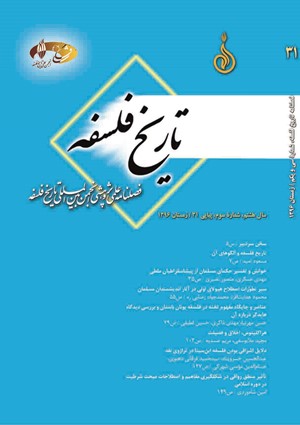تأثير منطق رواقي در شکلگيري مفاهيم و اصطلاحات مبحث شرطيات در دوره اسلامي
محورهای موضوعی : ریشهشناسی مکاتب و آراء فلسفی در ادوار قدیم و جدید
1 - دانشگاه اصفهان
کلید واژه: گزارههاي شرطي قياس استثنائي منطق دوره اسلامي منطق رواقي منطق مشائي ,
چکیده مقاله :
افنان و سامي النشار معتقدند متون اصلي انديشمندان رواقي در طي نهضت ترجمه در اختيار متفکران دورة اسلامي قرار گرفته است، در حالي که طبق ديدگاه ثيلت و فان اس، آموزههاي رواقي در طي تعاملات فرهنگي ميان مسلمانان و ساکنان مناطق تازه فتح شده، به انديشمندان مسلمان منتقل شده است. در نوشتار حاضر با انتقاد از اين دو نظريه، ديدگاه گوتاس درخصوص تأثير غيرمستقيم آموزههاي منطق رواقي از طريق آثار منطقداناني همچون جالينوس و اسکندر افروديسي مورد تأييد قرار ميگيرد. سپس با بررسي مفاهيم و اصطلاحات بکار گرفته شده توسط منطقدانان رواقي در تحليل گزارهها و استدلالهاي شرطي، چگونگي تأثير اين مفاهيم و اصطلاحات از خلال آثار منطقداناني همچون جالينوس و اسکندر افروديسي در شکلگيري مفاهيمي مانند «عناد»، «لزوم» و «استثناء» مورد بررسي قرار ميگيرد.
Afnan and Sami al-Nishar believe that Islamic philosophers found access to the main texts of Stoic thinkers during the translation movement. Nevertheless, Josef van Ess maintains that Muslim philosophers were exposed to Stoic teachings in the course of the cultural interactions between Muslims and the residents of newly conquered regions. In the present paper, after criticizing these two ideas, the writer agrees with Dimitri Gutas’s view regarding the indirect impact of Stoic logical doctrines through the works of such logicians as Galen and Alexander of Aphrodisias. Then, by examining the concepts and technical terms which are employed by Stoic logicians in the analysis of conditional propositions and reasonings, he investigates the effects of such concepts and terms through the works of the above-mentioned logicians in the development of certain concepts such as conflict, necessity, and exception.
